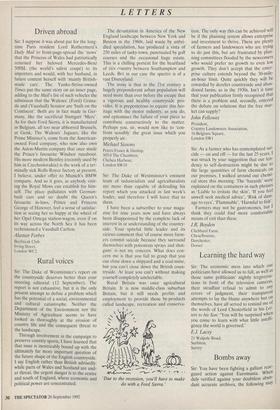Sir: The Duke of Westminster's eminent team of industrialists and
agriculturalists are more than capable of defending his report which you attacked in last week's leader, and therefore I will leave that to them.
I have been a subscriber to your maga- zine for nine years now and have always been disappointed by the complete lack of interest in or understanding of the country- side. Your spiteful little leader and its vicious comment that 'of course more farm- ers commit suicide because they surround themselves with poisonous sprays and shot- guns' is not my concern. What does con- cern me is that you fail to grasp that you can close down a shipyard and a coal-mine, but you can't close down the British coun- tryside. At least you can't without making yourself completely unelectable.
Rural Britain was once agricultural Britain. It is now middle-class suburban Britain, but it still needs profits and employment to provide those by-products called landscape, recreation and conserva- 'Due to the recession, you'll have to make do with a Ford Sierra.' tion. The only way this can be achieved will be if the planning system allows enterprise and investment to thrive. There are plenty of farmers and landowners who are trying to do just this, but are frustrated by plan- ning committees flooded by the newcomers who would prefer no growth to even low growth. They don't accept that the enter- prise culture extends beyond the 30-mile- an-hour limit. Quite quickly they will be rewarded by derelict countryside and aban- doned farms, as in the 1930s. Isn't it time that your publication firstly recognised that there is a problem and, secondly, entered the debate on solutions that the free mar- ket can supply?
John Fellowes
President, Country Landowners Association, 16 Belgrave Square, London SW I


































































 Previous page
Previous page